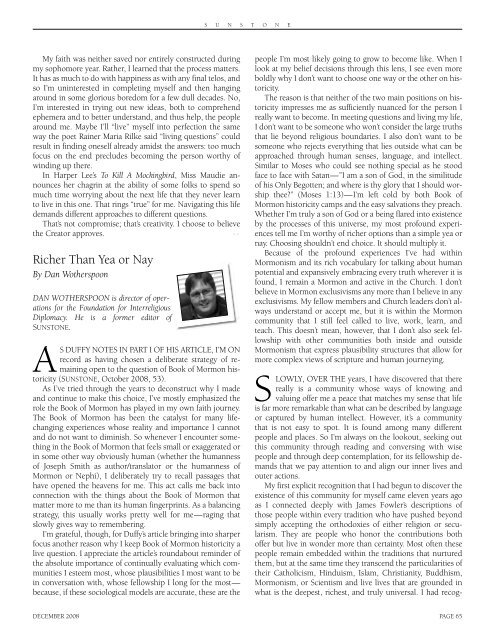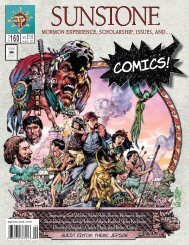Download Entire Issue PDF - Sunstone Magazine
Download Entire Issue PDF - Sunstone Magazine
Download Entire Issue PDF - Sunstone Magazine
You also want an ePaper? Increase the reach of your titles
YUMPU automatically turns print PDFs into web optimized ePapers that Google loves.
S U N S T O N E<br />
My faith was neither saved nor entirely constructed during<br />
my sophomore year. Rather, I learned that the process matters.<br />
It has as much to do with happiness as with any final telos, and<br />
so I’m uninterested in completing myself and then hanging<br />
around in some glorious boredom for a few dull decades. No,<br />
I’m interested in trying out new ideas, both to comprehend<br />
ephemera and to better understand, and thus help, the people<br />
around me. Maybe I’ll “live” myself into perfection the same<br />
way the poet Rainer Maria Rilke said “living questions” could<br />
result in finding oneself already amidst the answers: too much<br />
focus on the end precludes becoming the person worthy of<br />
winding up there.<br />
In Harper Lee’s To Kill A Mockingbird, Miss Maudie announces<br />
her chagrin at the ability of some folks to spend so<br />
much time worrying about the next life that they never learn<br />
to live in this one. That rings “true” for me. Navigating this life<br />
demands different approaches to different questions.<br />
That’s not compromise; that’s creativity. I choose to believe<br />
the Creator approves.<br />
Richer Than Yea or Nay<br />
By Dan Wotherspoon<br />
DAN WOTHERSPOON is director of operations<br />
for the Foundation for Interreligious<br />
Diplomacy. He is a former editor of<br />
SUNSTONE.<br />
AS DUFFY NOTES IN PART I OF HIS ARTICLE, I’M ON<br />
record as having chosen a deliberate strategy of remaining<br />
open to the question of Book of Mormon historicity<br />
(SUNSTONE, October 2008, 53).<br />
As I’ve tried through the years to deconstruct why I made<br />
and continue to make this choice, I’ve mostly emphasized the<br />
role the Book of Mormon has played in my own faith journey.<br />
The Book of Mormon has been the catalyst for many lifechanging<br />
experiences whose reality and importance I cannot<br />
and do not want to diminish. So whenever I encounter something<br />
in the Book of Mormon that feels small or exaggerated or<br />
in some other way obviously human (whether the humanness<br />
of Joseph Smith as author/translator or the humanness of<br />
Mormon or Nephi), I deliberately try to recall passages that<br />
have opened the heavens for me. This act calls me back into<br />
connection with the things about the Book of Mormon that<br />
matter more to me than its human fingerprints. As a balancing<br />
strategy, this usually works pretty well for me—raging that<br />
slowly gives way to remembering.<br />
I’m grateful, though, for Duffy’s article bringing into sharper<br />
focus another reason why I keep Book of Mormon historicity a<br />
live question. I appreciate the article’s roundabout reminder of<br />
the absolute importance of continually evaluating which communities<br />
I esteem most, whose plausibilities I most want to be<br />
in conversation with, whose fellowship I long for the most—<br />
because, if these sociological models are accurate, these are the<br />
people I’m most likely going to grow to become like. When I<br />
look at my belief decisions through this lens, I see even more<br />
boldly why I don’t want to choose one way or the other on historicity.<br />
The reason is that neither of the two main positions on historicity<br />
impresses me as sufficiently nuanced for the person I<br />
really want to become. In meeting questions and living my life,<br />
I don’t want to be someone who won’t consider the large truths<br />
that lie beyond religious boundaries. I also don’t want to be<br />
someone who rejects everything that lies outside what can be<br />
approached through human senses, language, and intellect.<br />
Similar to Moses who could see nothing special as he stood<br />
face to face with Satan—”I am a son of God, in the similitude<br />
of his Only Begotten; and where is thy glory that I should worship<br />
thee?” (Moses 1:13)—I’m left cold by both Book of<br />
Mormon historicity camps and the easy salvations they preach.<br />
Whether I’m truly a son of God or a being flared into existence<br />
by the processes of this universe, my most profound experiences<br />
tell me I’m worthy of richer options than a simple yea or<br />
nay. Choosing shouldn’t end choice. It should multiply it.<br />
Because of the profound experiences I’ve had within<br />
Mormonism and its rich vocabulary for talking about human<br />
potential and expansively embracing every truth wherever it is<br />
found, I remain a Mormon and active in the Church. I don’t<br />
believe in Mormon exclusivisms any more than I believe in any<br />
exclusivisms. My fellow members and Church leaders don’t always<br />
understand or accept me, but it is within the Mormon<br />
community that I still feel called to live, work, learn, and<br />
teach. This doesn’t mean, however, that I don’t also seek fellowship<br />
with other communities both inside and outside<br />
Mormonism that express plausibility structures that allow for<br />
more complex views of scripture and human journeying.<br />
SLOWLY, OVER THE years, I have discovered that there<br />
really is a community whose ways of knowing and<br />
valuing offer me a peace that matches my sense that life<br />
is far more remarkable than what can be described by language<br />
or captured by human intellect. However, it’s a community<br />
that is not easy to spot. It is found among many different<br />
people and places. So I’m always on the lookout, seeking out<br />
this community through reading and conversing with wise<br />
people and through deep contemplation, for its fellowship demands<br />
that we pay attention to and align our inner lives and<br />
outer actions.<br />
My first explicit recognition that I had begun to discover the<br />
existence of this community for myself came eleven years ago<br />
as I connected deeply with James Fowler’s descriptions of<br />
those people within every tradition who have pushed beyond<br />
simply accepting the orthodoxies of either religion or secularism.<br />
They are people who honor the contributions both<br />
offer but live in wonder more than certainty. Most often these<br />
people remain embedded within the traditions that nurtured<br />
them, but at the same time they transcend the particularities of<br />
their Catholicism, Hinduism, Islam, Christianity, Buddhism,<br />
Mormonism, or Scientism and live lives that are grounded in<br />
what is the deepest, richest, and truly universal. I had recog-<br />
DECEMBER 2008 PAGE 65

















